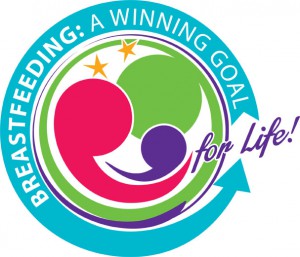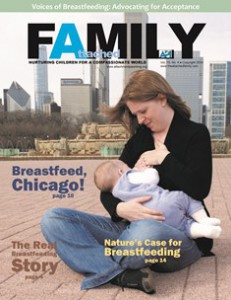By Heidi Ripplinger
 When I was little, I had a favorite baby doll. She was big enough for me to cuddle in my arms, was plump with silvery curly hair and had a round face. She looked like a cherub, and I loved her. I brought her with me everywhere I went. I changed her diapers, I wrapped her in warm blankets, I washed her face and I fed her bottles.
When I was little, I had a favorite baby doll. She was big enough for me to cuddle in my arms, was plump with silvery curly hair and had a round face. She looked like a cherub, and I loved her. I brought her with me everywhere I went. I changed her diapers, I wrapped her in warm blankets, I washed her face and I fed her bottles.
Yes, that’s right, bottles—the kind that had the pink nipple and the “milk” that flowed back and forth. I even had one that was divided into two liquids: orange juice and milk.
I never learned about nursing—well, that’s not entirely true. I think I intuitively understood what breasts were for, but I only saw one woman during my childhood breastfeed her baby, and she hid under a blanket, tucked away in an out-of-the-way room of her home while we were visiting.
I was 8 years old. I was exploring the house and stumbled across her sitting on a couch, all covered up, holding her baby. I asked her what she was doing under there, and she said she was nursing. I was confused. I had never heard that word before. I wanted to check it out.
I reached in to look under the blanket and was quickly told that it was private and I shouldn’t look. I felt embarrassed and humiliated, like I had done something terribly wrong and vile. I thought she was ashamed because I couldn’t come up with any other reason why she would hide what she was doing.
Later, I told my parents. My father laughed it off, and my mother looked annoyed. Now I really felt terrible. No one talked to me about it. No one helped me understand. No one paid much attention to the situation at all.
Fast forward to my 20s: I had a friend who just had her first baby. She was adamant that she would never breastfeed her children. She was convinced it was akin to incest, especially when they were older than three months. Because of my earlier experiences with nursing and because of being raised in a culture where women’s bodies were exploited and devalued for nothing more than a man’s plaything, I was inclined to agree with her.
But there was something gnawing at me. I couldn’t really tell what it was, just a quiet tapping deep in my soul. It moved around a lot, and it was the lightest whisper, so it took me a long time to hear it and even longer to listen. I had to be quiet. I had to be still. I needed to learn to sit with my baggage and noise that accumulated over the years of passive conditioning.
It took a very long time. It wasn’t until I was pregnant myself that the floodgates finally opened. It was akin to ocean waves crashing to the shore: I would nurse my babies. Better yet, I would nurse them on demand, openly—wherever I was—proudly and with no reservation. And I would nurse them for as long as they wanted. I felt released of my shame I had harbored since that fateful day long ago when I stumbled upon the breastfeeding mom. I felt empowered knowing I would be the one to give my children the perfect food, specifically made for them. No one else can do that, just me.
I nursed my first child until he was 4 years old. I’m nursing my second child, who turned 4 years old in June.
In the beginning, I had no idea what I was doing. I remember the first time I brought my firstborn to my breast. He was 15 minutes old. My midwife had helped me get out of the birthing tub and settled into a rocking chair that was in our living room. I was so tired, and my arms felt like Jell-O. We tried nursing, but my son just wanted to root and cuddle.
The next time was about an hour later. I was comfortably in bed and felt refreshed after having a nice dinner. My little love was hungry, but I couldn’t figure out how to get him to latch. I was so clueless to such a normal function of the human body, of our human connection.
Thankfully, my midwife was there and was experienced herself. With a little coaching and a lot of patience, my son filled his belly and I filled my soul. In that moment, I knew what it was to be a momma—his momma—and I was in love. I could feel another voice in my soul starting to emerge, a voice that would eventually lead me to understand where our power as women lies. Once again, I needed to be still and listen.
—


Beautiful, powerful story! Thank you for sharing.